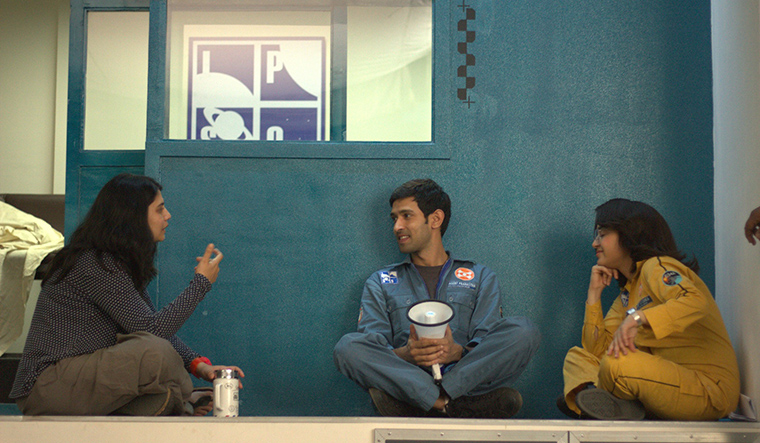In the Hindi sci-fi film Cargo, Prahastha (Vikrant Massey), the sole astronaut in the spaceship Pushpak 634A, has, for centuries, been running a strange immigration service of arrivals and departures called Post Death Transition. Every morning, his spaceship hovers near earth to collect dead people to store, process and recycle for rebirth. Prahastha, who has worked on millions of reincarnations so far, is bored, resigned, mechanical and insensitive, much like the machines around him. He has become one with his spaceship, which is as old and lumbering as a bureaucratic, state-owned bank.
Sci-fi films, by definition, have a laundry list of outer-space regalia—projectile-style rocket ships, fantastic-looking moon dwellers, slick robots, floating cosmonauts in shiny spacesuits, aliens befriending teenagers on earth.... Otherwise, we all want to achieve the other-worldly finesse of Gravity, Interstellar or 2001: A Space Odyssey. But software engineer-turned-filmmaker Arati Kadav likes the scrappiness of the British sci-fi TV show, Doctor Who. She knows a “jugaad ka spaceship” hits closer home than CGI-induced grandeur. “The world of Cargo is retro and clunky. I wanted to make the spaceship more like a living organism, which has its hiccups and breakdowns,” says Kadav of her debut sci-fi film, which was scheduled to be screened at the Indian Film Festival of Los Angeles (IFFLA) in April. The festival has been postponed due to the Covid-19 pandemic.
In Cargo, the dark, mysterious vastness of space, science and mythology is made light and easy. Like a funny little rom-com or a cute coming-of-age drama. Philosophical debates on time and space are seen through an irreverent, childlike gaze. Multiple dead bodies with their own backstories come for a rejig, and their souls are sent off anew. Co-produced by Anurag Kashyap, Cargo was also to be screened at the 2020 SXSW (South By Southwest) Film Festival in Texas in March, but the festival was cancelled. Kadav had been looking forward to attending the tech conferences at the festival, addressing such topics as what happens if you have a robot as your constant helper; the age of living machines; how to design your own death (so you do not get resurrected by advanced machines); whether, like in Matrix, we will have neural implants for skills; and experiments in digital cloning and sex robots.
Humanise, lighten up, localise—call it what you will, but this is a good time to demystify sci-fi and make it less alpha-geek. In the recent Malayalam film Android Kunjappan Ver 5.25, a desperate son gets a robot in a mundu to take care of his aging father. In Cargo, Shweta Tripathi plays Yuvishka, an enthusiastic new joinee onboard Pushpak 634A. She comes in as a colourful burst of disruption in Prahastha’s life. Her character as a bright assistant learning to recycle cargoes of dead bodies has her surprised. “I wanted to play a gangster and a mafia queen,” she says. “Sci-fi would not even have occurred to me. Where does it even happen in India?” It is only after watching the premiere of Cargo at MAMI last year that Tripathi learnt its true import. That there is no black hole when it comes to human memory. As she says: “No one is ever truly forgotten or erased even after they are gone.”


